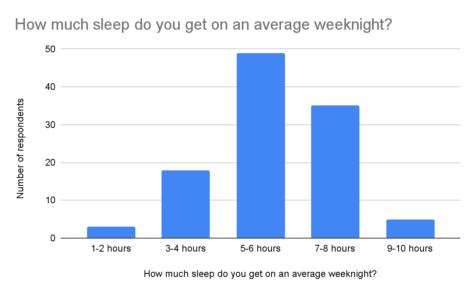Students aren’t getting enough sleep. What can be done?
If you ask a high school student how they are, odds are they’ll say, “tired.” It’s the baseline expectation, really. All students are tired. That’s just how it goes. But it shouldn’t be.
According to the CDC, teenagers should get 8-10 hours of sleep per 24 hours. If they don’t get enough sleep, the CDC says, they “have a higher risk of obesity, diabetes, injuries, poor mental health, and problems with attention and behavior.” (CDC) The American Academy of Pediatrics (AAP) lists a whole host of adverse consequences of teenagers not getting enough sleep, including “impairments in mood, affect regulation, attention, memory, behavior control, executive function, and quality of life,” as well as poor academic performance, an increased risk for anxiety and mood disorders, increased use of stimulants like caffeine, risk of drowsy-driving-related crashes, higher risk for cardiovascular diseases, and more. (AAP)
So sleep is important. But teenagers aren’t getting enough.
 We surveyed Shorecrest students about how much sleep they get. Of 110 respondents, 64% reported getting 5-6 hours of sleep or less on an average weeknight, and 80% said they get “less than I’d like” or “way too little” sleep. Many said that their lack of sleep leads to having a hard time focusing and learning in class, being tired or in a daze all day, and having a lack of energy. It affects their mood too, making them stressed, cranky, or moody. Some students even fall asleep in class. One respondent said, “I feel tired during the day and have less energy. It feels like I’m trying to just make it through the day rather than actually learn.”
We surveyed Shorecrest students about how much sleep they get. Of 110 respondents, 64% reported getting 5-6 hours of sleep or less on an average weeknight, and 80% said they get “less than I’d like” or “way too little” sleep. Many said that their lack of sleep leads to having a hard time focusing and learning in class, being tired or in a daze all day, and having a lack of energy. It affects their mood too, making them stressed, cranky, or moody. Some students even fall asleep in class. One respondent said, “I feel tired during the day and have less energy. It feels like I’m trying to just make it through the day rather than actually learn.”
When asked what would help them get more sleep, students had two very clear requests: less homework and later start times. Not only did many students say the same thing, but they were very clear in how necessary they thought it was. The responses were full of exclamation points and capital letters. One student said, “plz plz plz change the school start time to 8:30 pleaaaseeeeeeeeeee maybe even 8:45 I’m literally begging, I can’t do this anymore. If anyone who reads this has the power to do that then PLEASE make it work, make it make sense, it can’t be that complicated. PLEASE UGH it’s actually driving me insane.”
There is precedent for shifting high school start times later. Starting in the 2016-2017 school year, the Seattle school district moved the start times for middle and high school students from 7:50 to 8:45. A study from the University of Washington found that “students got 34 minutes more sleep on average with the later school start time. This boosted their total nightly sleep from 6 hours and 50 minutes to 7 hours and 24 minutes.” They also found that academic performance improved and there was more participation in class discussions. (NPR)
In addition to work that makes students stay up late, teenagers just have a hard time biologically falling asleep early enough to get as much sleep as they need while also waking up in time for school. In order to get to school at 7:50, a student might have to wake up at 6:00, meaning that they should be asleep by 10:00 at the latest. However, research shows that, due to a shift in circadian rhythm in adolescence, among other factors, “the average teenager in today’s society has difficulty falling asleep before 11:00 pm and is best suited to wake at 8:00 am or later.” (AAP) This optimal sleep schedule is impossible with the early start time of many high schools.
A common concern about shifting start times later is that students will just stay up later and negate the benefits of the delayed start. However, a number of studies have shown that this does not happen. When start times are delayed, students’ bedtimes remain about the same, but they sleep in later and therefore get more sleep. They also are less sleepy in class and often perform better academically. As a result of this strong evidence, the AAP recommended in 2014 that schools shift their start times later (to after 8:30 am) in order to optimize sleep for students. They also acknowledged that, while this is an important step, other changes are also necessary in order to increase sleep for middle and high school students. (AAP)
One of these other necessary changes is reducing the amount of homework students have to do after school, which would allow them to go to sleep earlier. Students are busy: they have extracurriculars, work, college applications, and more, on top of their schoolwork. This means that in order to get all of the homework they’re assigned finished, they’re often forced to stay up late and cut into their precious sleep time.
Yes, homework can be useful for teaching students time management skills and practicing topics they learned in class. However, these goals could still be accomplished with a reduced amount of homework, while also allowing students to have more time to devote to other activities and to getting enough sleep. Class time could also potentially be used more efficiently. One student who responded to our survey said, “It is really frustrating how good my sleep schedule was last year, when we had plenty of asynchronous time for homework and our teachers utilized in-class time much better. Now it seems like we’ve gone backwards. I just waste a lot of the time I have at school listening to lectures and go home with 5 hours of homework to do. It feels unfair and inconsiderate.”
The endless cycle of too much homework, late night work, and early mornings is one that is causing extreme harm to high school students. The school and district can help students get more sleep by doing two simple things: make high schools start later and reduce the amount of homework dumped on students. These changes are essential. Please, take action to make it so that being lethargic all day at school is not the norm.









J. Jaffe • Jan 22, 2022 at 3:18 pm
I appreciate what you have said here, and wholeheartedly agree. I’d add one more thing I have heard from many teens: it would help if school departments could coordinate test schedules (homework, too, but especially tests), so students do not have an overload of tests happening on the same day. Maybe each department could have their own day when tests are given, to spread out studying over the week. Obviously, with 5 school days in a week, there would be some overlap, but ideally not as much as sometimes occurs. Does that apply to your school?